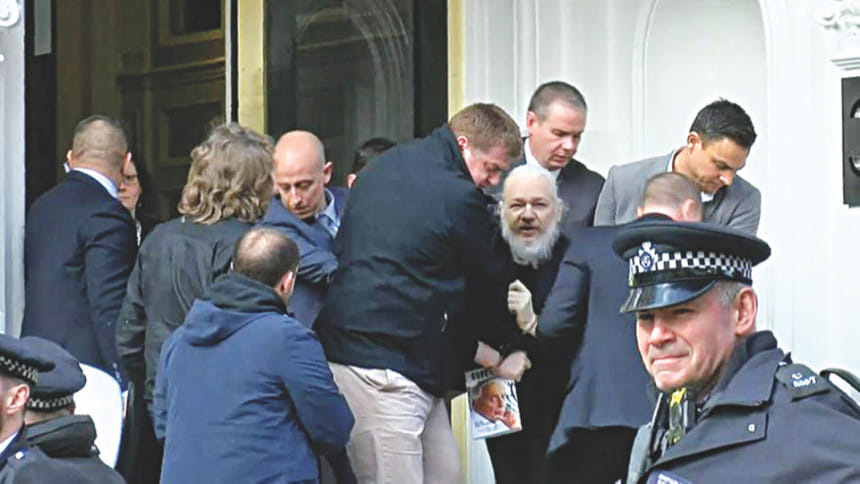The aftermath of Assange's arrest

The WikiLeaks founder Julian Assange was arrested on April 11, 2019 from the embassy of Ecuador in London where he had been staying under a diplomatic asylum since 2012. He came to international spotlights in 2010 when WikiLeaks published records of state affairs of many countries including the videos and documents of US policies on Afghan and Iraq war.
US accused Assange of leaking classified records through illegal computer intrusions and initiated criminal charges for such leakage. At the same time, Sweden issued an international arrest warrant against Assange on rape and sexual assault charges. But Assange denied the allegations. Afterwards, on December 7, 2010, Assange surrendered to UK police and sought protection of the UK Court against his extradition to Sweden, which he lost.
When Assange was in London out on bail, he sought the asylee status from the embassy of Ecuador in London. He was granted diplomatic asylum by Ecuador in August 2012 despite the opposition of UK government. This controversial step resulted in a standoff, not merely between UK and Ecuador, but between larger factions, i.e. States which recognise or reject the right to grant diplomatic asylum. UK claimed that the grant of diplomatic asylum to Assange is violative of the Diplomatic and Consular Premises Act, 1987 of UK and therefore, it had the legal right to arrest Assange from the embassy of Ecuador in London.
Ecuador maintained that the arguments of UK are clear violations of Article 22 of Vienna Convention on Diplomatic Relations, 1961 which provides that the premises of embassies shall be inviolable and the agents of the receiving State may not enter them, except with the consent of the head of the mission. Ecuador also referred to Article 2 of the Havana Convention on Political Asylum, 1928 which directs that States have to respect the asylum granted to political offenders in diplomatic missions “to the extent it is allowed, as a right or through humanitarian toleration, by international law, [state practice and domestic law of the territorial State].” Ecuador further cited Article II of Caracas Convention on Diplomatic Asylum, 1954 which grants every State a right to grant diplomatic asylum and does not impose an obligation thereof.
The legal arguments of Ecuador had strong basis in international law. For instance, the International Court of Justice opined in the Asylum Case that asylum granted cannot be contrary to law. An exception to this rule can only occur if, arbitrary action is substituted for the rule of law in the guise of justice. Thereafter, seven years elapsed until the arrest of Assange in April 11, 2019 by London Metropolitan Police. Assange was arrested with the consent of Ambassador of the Ecuador Embassy in London when Ecuador withdrew the asylum status upon a sovereign decision. The president of Ecuador also argued in a video address in April 11, 2019 that granting and withdrawing asylum status is a sovereign right of Ecuador and the decision withdrawing diplomatic status was taken because Assange interfered with the internal affairs of other States during his stay at Ecuadorian embassy in London. This interference is a violation of the Conventions on Diplomatic Asylum of Havana and Caracas.
Immediately after the arrest, London Metropolitan Police issued a notice declaring that Assange has been arrested on behalf of the United States authorities under Section 73 of the Extradition Act, 2003 between UK and US. As Sweden had already dropped the international arrest warrant against Assange in 2017, it is evident from the notice that UK has initiated the legal process to extradite Julian Assange to US. It is also clear from the persistent claims of US authority that if Assange were extradited, he would face charges under the US Espionage Act that permits death penalty. However, the principle of international law on extradition as well as the Extradition Act, 2003 of UK and US prohibits extradition for the offences if there is a risk that death penalty may be applied. So, the death penalty exception of extradition is one of the strong legal grounds relying on which the legal team of Julian Assange could rescue him.
Article 18(1) of Extradition Act, 2003 of UK and US incorporates the Rule of Specialty that is a principle of International law included in most extradition treaties, whereby a person who is extradited to a country to face trial for certain criminal offenses may be tried only for those offences for which he has been extradited. If US still stand by its allegations of espionage against Assange, the rule of specialty will act as a strong legal barrier in the extradition process as US Espionage Act permits death penalty.
Now, two options are available to US- either to request UK to waive the rule of specialty or to set aside the espionage charge that permits death penalty even though the waiver of specialty rule by UK will be the violation of the principle of international law and extradition treaty.
The writer is an LLM student at South Asian University, New Delhi, India.

 For all latest news, follow The Daily Star's Google News channel.
For all latest news, follow The Daily Star's Google News channel. 



Comments